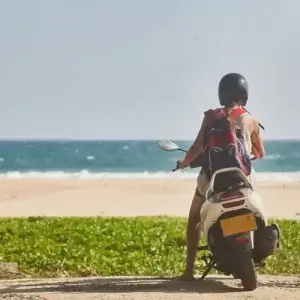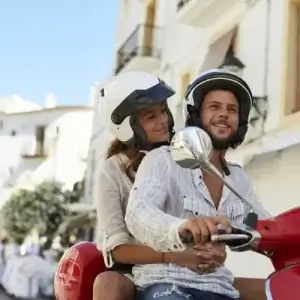Home / Compare Travel Insurance / Travel insurance with mo…
Travel insurance with motorcycle, scooter and moped cover



Key takeaways
Whether you’re a veteran of driving two-wheeled vehicles or have recently received your full motorcycle driving licence, we’ll take you through what kind of travel insurance you’ll need for riding motorcycles overseas.
- While it’s often just known as ‘motorcycle cover’ or ‘motorcycle travel insurance’, this cover is typically an add-on to policies and can include a number of vehicles beyond motorcycles, including scooters, mopeds or quad bikes; although, cars will need a different cover.
- If you plan to drive overseas, you’ll need an International Driver’s License to drive legally overseas – if you drive without a license, any related claims will likely not be accepted.
- Your travel insurance with motorcycle cover may help reimburse you for any medical expenses if you’re in an accident while overseas; without this cover, you’ll likely need to pay out-of-pocket.
Expert tips for choosing the right motorcycle cover for you
Our Executive General Manager of General Insurance, Adrian Taylor, has a few tips for helping you choose a suitable travel insurance policy with scooter, motorbike and moped cover.

Check the automatic inclusions on your policy
You’ll commonly need to purchase extra cover to be covered while riding; however, some policies may offer this cover automatically, so always check the inclusions of your policy before purchasing.
Know the engine capacity of your rental vehicle
Some policies will only cover the engine capacity for your motorcycle or moped up to a certain amount (e.g. 250cc), so if you’ve already booked a motorbike with a rental company, check both the engine capacity and your policy to make sure you can be covered.
Consider what other cover you need
While it’s important you’re covered for riding a motorbike or scooter, you should also weigh up comprehensive travel insurance cover, which may financially protect you, your belongings and your trip against some unforeseen events such as medical expenses, cancellations, theft and more.
The basics of getting travel cover for two-wheeled vehicles
How can I get travel insurance cover for riding motorcycles?

You may get travel insurance with moped, motorcycle and scooter cover through either a standard travel insurance policy or an adventure activities add-on (which costs extra). It depends on the insurer and what they offer, as well as your individual circumstances, needs and budget.
This makes it crucial to review the Product Disclosure Statement (PDS) before you purchase a policy to check what’s covered, especially if you plan on riding a motorcycle on your travels. You should also consider reading the Target Market Determination (TMD) to check your suitability for a policy.
Is motorcycle, scooter and moped cover automatically included in my policy?
No, many travel insurance policies will exclude motorcycles, scooters and mopeds from their standard policies. However, you may be able to purchase motorcycle cover for an additional premium.
What’s included in motorcycle, scooter and moped cover?
Getting cover for motorcycling means that you can claim on medical fees and hospital expenses related to motorcycle accidents, as well as 24/7 emergency assistance. Depending on your level of cover, you can also be covered for emergency evacuation and repatriation back to your home country of Australia; just make sure you understand the exclusions on your policy relating to wearing helmets and disobeying road rules. Without motorcycle cover, you will typically need to cover these costs yourself, which could put you back thousands of dollars.
Travel insurance exclusions for motorcycle riding
Like most types of travel insurance, some things won’t be covered even if you purchased additional motorcycle cover. While policy exclusions can differ across insurers, common travel insurance exclusions relating to two-wheeled vehicles include:
- Riding a motorcycle, moped or scooter that’s more powerful than what’s covered by your policy
- Racing, speeding, disobeying a country’s road laws or driving recklessly
- Being intoxicated by an illegal substance or alcohol
- Not wearing a helmet
- Driving without a motorcycle licence that’s valid in your destination country
- If you’re driving in a professional capacity, such as participating in a competitive or professional event.
Furthermore, while your travel insurance policy may cover personal liability not related to your motorcycle or other vehicle, if you were in control of the vehicle you may not be covered if you damage your vehicle, another person’s property or cause injury or death.
Check the PDS to know exactly what’s excluded. Knowing to what extent an insurer covers these instances can help provide peace of mind when exploring an international destination from the seat of a motorbike.
More about travel insurance with motorcycle cover
Am I covered if I’m a passenger on a motorbike?

You can be covered as a passenger so long as the driver:
- Has appropriate insurance (that states pillion passengers are covered)
- Has a license to ride motorcycles in that particular country
- Is in control of a motorcycle, moped or scooter with an engine that falls within the insurance policy’s bounds.
Having this cover in your travel insurance can be handy for couples who plan on travelling together on one hired bike. However, coverage for passengers may vary among insurers, and it’s important to check the PDS to see how much a policy provides for a passenger on a motorbike.
Are learner drivers covered for riding a motorcycle overseas?
No, learners and provisional licence holders typically aren’t covered by travel insurance for their driving, whether they’re in a car, motorcycle, moped or scooter.
Do quad bikes count as motorcycles?
Quad bikes and all-terrain vehicles (ATVs) generally fall in the same category as motorcycles regarding travel insurance. For example, a standard travel insurance policy may cover low-powered scooters, but mopeds, motorcycles or quad bikes might only be covered by an adventure sports add-on.
Always check the PDS of an insurance policy for details on what you will and won’t be covered for.
Can I still be covered for motorbikes if I have a pre-existing medical condition?
If you have any pre-existing medical conditions, be sure to declare them when taking out your travel insurance policy. Not all conditions are covered, however, and depending on the nature of your condition, you may have to pay an additional premium for them to be covered.
Can I still get annual cover with motorcycle, scooter and moped protection?
Yes, whether you’re taking a single trip or interested in an annual multi-trip policy, you can still be covered for travel insurance with motorcycle cover.
What to know when driving overseas
What do I need to drive a motorcycle overseas?
For you to be covered for losses relating to riding a motorcycle overseas, most insurers will require you to have an Australian motorcycle licence. Other insurers may be satisfied if you have a valid licence in the country that you’re riding in.
The vehicle’s class and engine size you’ll be covered for will differ between insurers. The engine size covered by your policy may be based on what you’re licensed to ride in Australia. Some insurers might set a specific limit on the allowable engine capacity of your motorbike, even if you’re licensed to ride a more powerful machine back home. For example, some insurers set the limits at 250cc for motorcycles and 50cc for mopeds and scooters.
Depending on which country you’re heading to, you might need an international driver’s permit, as some countries may not accept an Australian licence on its own. Whether you’re getting travel insurance to cover scooters in Bali or motorcycles in the USA, it’s vital to check each country’s rules regarding tourists driving (or riding) on their roads.
As coverage can differ between insurers, it’s essential to check the PDS to ensure you’re covered for your choice of bike and for riding it in your chosen destination.
What to be aware of when driving overseas
- In many Southeast Asian countries such as Thailand, Laos and Cambodia, road safety is not as high a priority as in Australia. Both motorcyclists and car drivers alike often speed, ignore road rules and grapple for space without consideration for other drivers on the road. Accidents are common, so driving with care and caution is extremely important for your safety.
- When visiting places like Bali, Indonesia, tourists often drive scooters and motorbikes without a valid licence. Not only can this get you into legal trouble, but without a valid driver’s licence, you cannot claim on any injuries if you have an accident on your two-wheeled vehicle.
- Unlike with renting a car, when renting a motorcycle, scooter or moped, your travel insurance policy will not cover the rental vehicle excess if you have an accident. This means any damages to your vehicle are paid directly out-of-pocket. Your motorcycle cover will, however, cover medical treatment or hospital expenses if you’re injured while riding.
- The required driver’s licence can vary between countries. Some countries only require a valid Australian motor vehicle licence, while in others, you can get a local licence once you arrive. However, some destinations, like Vietnam, require you to have both.
Meet our travel insurance expert, Adrian Taylor
As a General Insurance expert with over 13 years’ experience in financial services, Adrian Taylor believes in educating customers about the importance of travel insurance so that anyone can kick back and make the most of their time away from home. While no one wants a disrupted holiday, a suitable travel insurance policy can provide a financial safety net for yourself, your belongings and your trip in case things go wrong.
